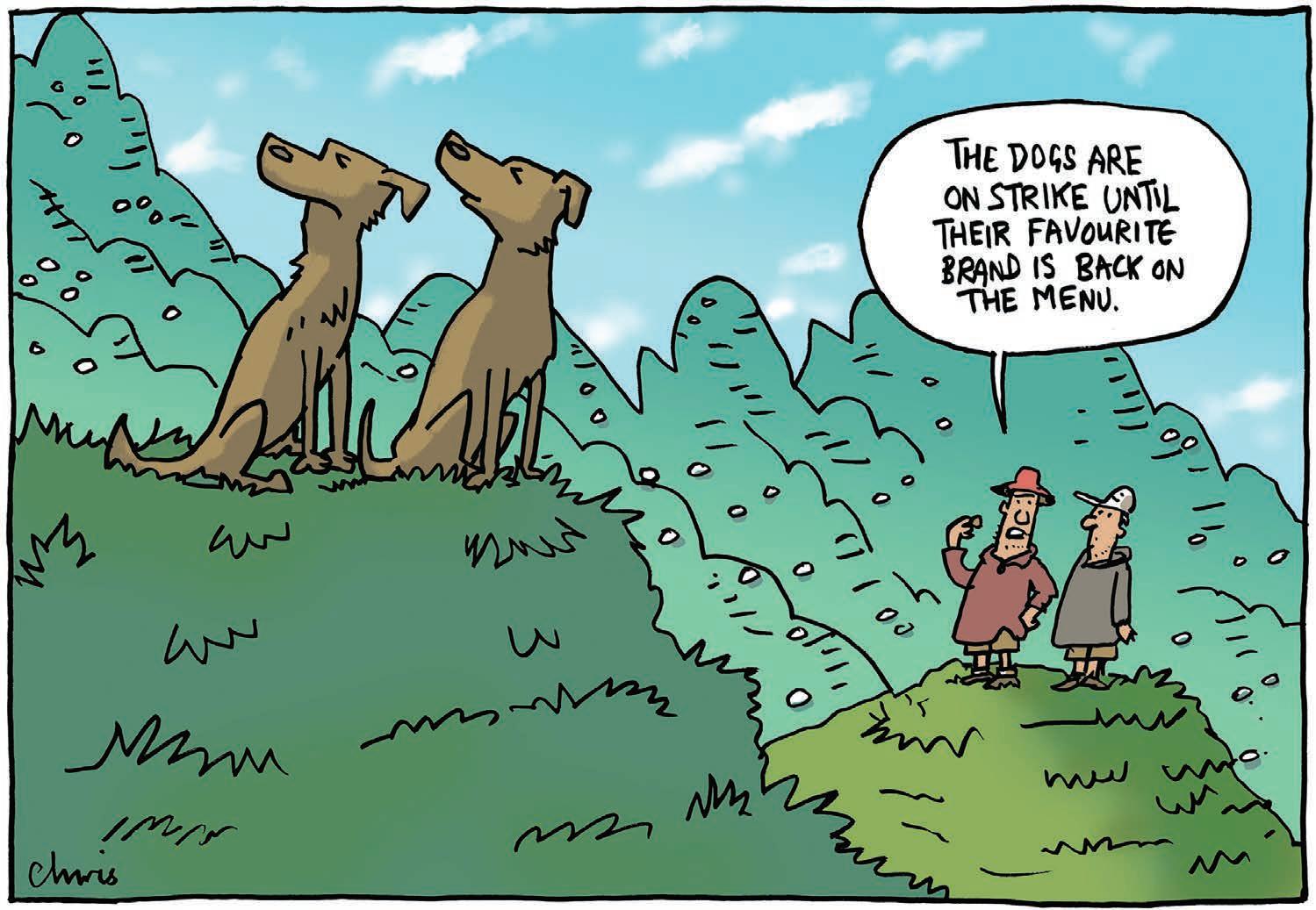
4 minute read
Editorial
Education better than denigration
SILVER Fern Farms’ annual report predicts global meat production will grow just 1.4% and will mainly be led by chicken and pork.
Global beef production is predicted to nudge up a touch, though SFF’s own beef offerings grew 17%.
That’s a good sign in a world that is putting red meat under the blowtorch for its climate impact.
Just last week the big recipe website Epicurious announced it had taken beef off the menu and wouldn’t help readers cook beef anymore.
It said it was not anti-beef but proplanet.
Denmark just released its new national dietary guidelines and they now include the greenhouse gas impact of each food. The guidelines also significantly reduce the amount of meat that Danes should eat.
New Zealand red meat producers and marketers will have to prepare for more of this sort of thing in the future. Every aspect of our life and diets is being scrutinised for its impact on the environment and the climate. But that’s not such a bad thing for NZ food producers, if we engage the right way.
The way to react is not to ridicule, but to educate.
People and businesses are entitled to make their own choices about what they eat or promote.
NZ red meat production is pretty light on the land. There are no broadacres of crops needed to keep our cattle fed. Our red meat is raised mostly on land that could not produce any other food. Many sheep and beef farms integrate forestry and conservation blocks.
This is a good story to tell. Much of the world’s meat production is brought about through an extractive system. Ours is more regenerative in its nature.
So let’s stick to telling the story of what we do well, rather than denigrating others for choices they make.
Let’s make sure when people do choose to eat red meat, it is ours that they choose.
Bryan Gibson
LETTERS Productivity growth is a good thing
I’VE just read an article on regenerative farming quoting Jules Mathews, where she says “negative comments about what constitutes regenerative agriculture are achieving nothing...”. She then goes on to make negative comments about farming: “...farming has become an unintended treadmill, with farmers having been encouraged and trained to use a model solely focused on production and productivity. This has come at the expense of the environment, livestock care, biodiversity and people”.
When those promoting regenerative agriculture make comments like this, I find it personally insulting and it makes me angry.
I’ve been a conventional farmer for 41 years on typical Northland class 6 hill country. I started in the late 1970s using the best scientific advice I could get and used it alongside good business planning. The farmland then hadn’t seen fertiliser in 10 years and was basically one large paddock. With fertiliser, lime and fencing allowing rotational grazing, I’ve improved the topsoil from the cigarette paper thin it was then.
I started fencing off my waterways about 26 years ago and with the fenced off bush blocks, I used them to further subdivide the farm.
The farm now is a finishing block. So, since I started farming the production has gone up and the productivity has improved.
I’ve improved the soil and the environmental impact, my cattle look great and I’m happy as being a conventional farmer.
I’ve attended field days, workshops seminars and I’ve never experienced promotion of production in itself, only as a means to improve productivity and profitability.
Mathews is implying that productivity is a bad thing, when it’s a measure of the efficiency of the farm, it’s output divided by input. Increasing productivity is a good thing; increasing production may or may not increase productivity depending on the amount of input to increase that production.
I’m at a loss to know why acid-based fertiliser or chemical-based fertiliser is a problem when I’ve used it to improve my soils.
My maintenance rate would be 250kg per hectare of super; this is the same as 25g per square metre, five teaspoons/ sqm – how much does 10cm of topsoil in a sqm weigh?
The acidifying effect on 10cm of topsoil/sqm wouldn’t register in a soil test. Don’t forget us conventional farmers are applying lime to reduce the acidifying effect of growing grass.
Then the comment that regenerative farming is “... valued-based. It’s principledbased”.
So, the conventional farming I’m doing means I have no values and am unprincipled?
If you want collaboration you need to stop insulting those you want to collaborate with.
Laurie Copland
Broadwood
Farmers Weekly is published by GlobalHQ, PO Box 529, Feilding 4740. New Zealand Phone: 0800 85 25 80 Website: www.farmersweekly.co.nz EDITOR Bryan Gibson 06 323 1519
bryan.gibson@globalhq.co.nz EDITORIAL Carmelita Mentor-Fredericks 06 323 0769 editorial@globalhq.co.nz Neal Wallace 03 474 9240 neal.wallace@globalhq.co.nz Colin Williscroft 027 298 6127 colin.williscroft@globalhq.co.nz Annette Scott 021 908 400 annette.scott@globalhq.co.nz Hugh Stringleman 09 432 8594 hugh.stringleman@globalhq.co.nz Gerald Piddock 027 486 8346 gerald.piddock@globalhq.co.nz Richard Rennie 07 552 6176 richard.rennie@globalhq.co.nz Nigel Stirling 021 136 5570 nigel.g.stirling@gmail.com PUBLISHER Dean Williamson 027 323 9407 dean.williamson@globalhq.co.nz ADVERTISING Andy Whitson 027 626 2269 New Media & Business Development Lead andy.whitson@globalhq.co.nz Steve McLaren 027 205 1456 Auckland/Northland advertising steve.mclaren@globalhq.co.nz Jody Anderson 027 474 6094 Waikato/Bay of Plenty advertising jody.anderson@globalhq.co.nz Donna Hirst 027 474 6095 Lower North Island/international advertising donna.hirst@globalhq.co.nz Ernest Nieuwoudt 027 474 6091 South Island advertising ernest.nieuwoudt@globalhq.co.nz Clint Dunstan 027 474 6004 Real Estate & Farm Machinery advertising clint.dunstan@globalhq.co.nz ISSN 2463-6002 (Print) ISSN 2463-6010 (Online) Ella Holland 06 323 0761 Livestock advertising 027 602 4925 livestock@globalhq.co.nz Debbie Brown 06 323 0765 Classifi eds/Employment advertising classifi eds@globalhq.co.nz Grant Marshall 027 887 5568 AgriHQ Partnership Manager grant.marshall@globalhq.co.nz Andrea Mansfi eld 027 446 6002 Salesforce director andrea.mansfi eld@globalhq.co.nz Steph Holloway 06 323 0142 AgriHQ Commercial Leader steph.holloway@globalhq.co.nz PRODUCTION Lana Kieselbach 027 739 4295 production@globalhq.co.nz Advertising material adcopy@globalhq.co.nz SUBSCRIPTIONS 0800 85 25 80 subs@globalhq.co.nz Printed by Ovato NZ Ltd Delivered by Reach Media Ltd







